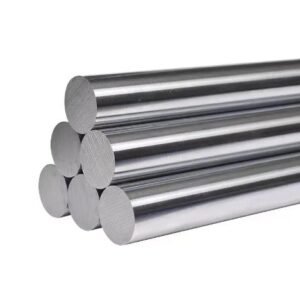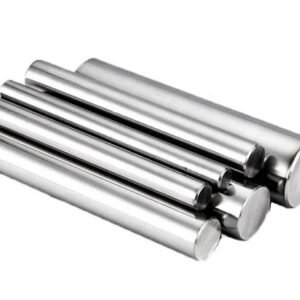Stainless steel round bars are available in various grades, each with its own specific composition and properties tailored to different applications. The choice of grade depends on factors such as corrosion resistance, strength, temperature resistance, and intended use. Here are some common stainless steel grades used for round bars:
Austenitic Stainless Steels: These grades are known for their excellent corrosion resistance and formability. They are non-magnetic and often used in environments where exposure to corrosive substances is a concern. Common austenitic grades include:
304 (A2) and 316 (A4): These are the most widely used stainless steel grades for general purposes. They are often used in food processing, architectural applications, and marine environments.
321: This grade contains titanium, which stabilizes the alloy against sensitization during high-temperature applications, making it suitable for exhaust systems and high-temperature environments.
Ferritic Stainless Steels: Ferritic grades are known for their magnetic properties and corrosion resistance. They are often used in applications where high-temperature strength is not a primary concern. Common ferritic grades include:
430: This grade is commonly used in decorative applications, such as kitchen appliances and automotive trim.
Martensitic Stainless Steels: Martensitic grades are heat-treatable and offer good strength and hardness. They are often used in applications requiring wear resistance and high mechanical properties. Common martensitic grades include:
410 and 416: These grades are used in applications where hardness and corrosion resistance are required, such as cutlery and valve components.
Duplex Stainless Steels: Duplex grades combine the properties of austenitic and ferritic stainless steels. They offer improved corrosion resistance and strength compared to austenitic grades. Common duplex grades include:
2205: This grade is used in applications where higher corrosion resistance and strength are needed, such as chemical processing and marine environments.
Precipitation Hardening Stainless Steels: These grades can be hardened through heat treatment, offering a combination of high strength and corrosion resistance. Common precipitation hardening grades include:
17-4 PH: Used in aerospace, chemical processing, and other applications requiring a balance of strength and corrosion resistance.
Specialty Stainless Steels: Some stainless steel grades are designed for specific applications, such as:
316L (low carbon version of 316): Used in applications where welding and corrosion resistance are critical, such as medical implants and pharmaceutical equipment.
440C: Known for its high hardness and wear resistance, used in bearings and cutting tools.
When selecting a stainless steel round bar grade, it’s important to consider factors such as the intended environment, temperature, mechanical properties, and the required level of corrosion resistance. The specific grade chosen will impact the performance and longevity of the end product or application.




评价
目前还没有评价